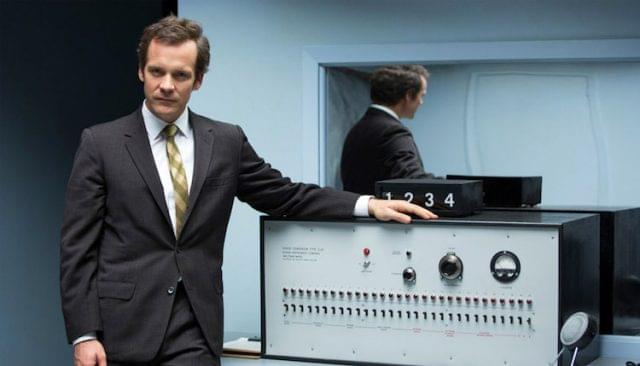
Stanley Milgram was a social psychologist whose work included studies on the “six degrees of separation” theory, which offers the reassurance that all members of the human family are connected to one another. But Milgram is better known for an experiment with more unsettling results, one that measured people’s willingness to inflict pain on strangers. That study is the subject of “Experimenter,” a playful, self-aware movie with an eccentric personality.
Milgram, played by a twinkly-eyed Peter Sarsgaard, breaks the fourth wall to narrate the story from the standpoint of one who has already lived it. Writer-director Michael Almereyda, who made a modern “Hamlet” with Ethan Hawke back in 2000, uses things like visual metaphors (an elephant in the room) and deliberately fake backdrops to remind us of the movie’s inherent artificiality. Just as Milgram tricked people into believing something that wasn’t true, Almereyda (and every other filmmaker) fools us with lights and shadows.
But first we see the 1961 Yale experiments reenacted. Volunteers are told they’re participating in a study about negative reinforcement as a teaching device. When an unseen person in the next room gives an incorrect answer to a question, the volunteer flips a switch that delivers a small electric shock. The shocks get more powerful with each wrong answer, and the victim’s pained reactions are audible. (The victim is really an actor, and there are no shocks.) The question is how far this can go before the volunteer refuses to continue hurting an anonymous stranger.
The answer turns out to be “much further than we thought.” This has chilling ramifications for our understanding of human behavior, and Milgram’s findings are controversial, not least because some view his methods as unethical. The film takes us through the whirlwind of notoriety that followed, including an amusing visit to the set of a TV movie based on the experiment, starring Ossie Davis (Dennis Haysbert) and William Shatner (Kellan Lutz). Winona Ryder adds warmth as Milgram’s supportive wife, while Anton Yelchin, John Leguizamo, Anthony Edwards, Jim Gaffigan, Josh Hamilton, and others appear as test subjects and colleagues.
Almereyda shrewdly avoids telling Milgram’s entire biography, focusing instead on the more easily managed story of this experiment and its aftereffects. As Milgram, Sarsgaard is resourceful and optimistic, a trustworthy pal who’s eager to let us in on his secrets. Despite the alarming questions the study raised about human nature, the film is enjoyably relaxed, a humorous and upbeat account of a fascinating phenomenon. All social science should be this entertaining!
B+ (1 hr., 34 min.; )





